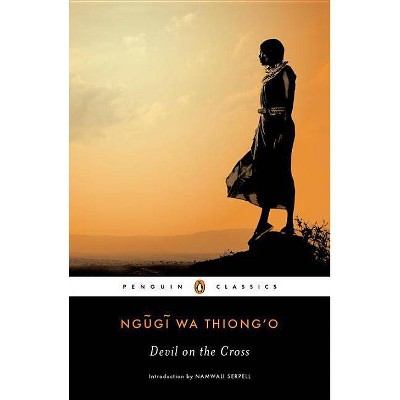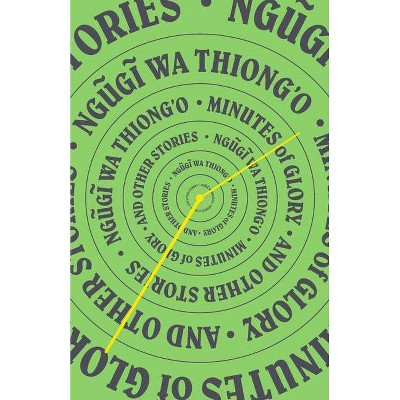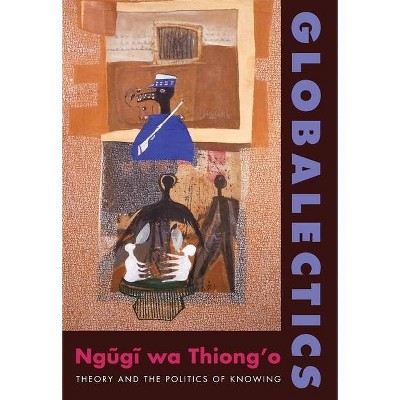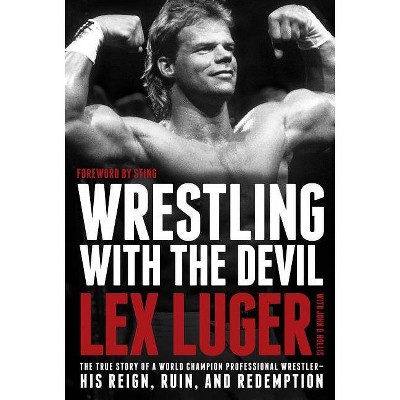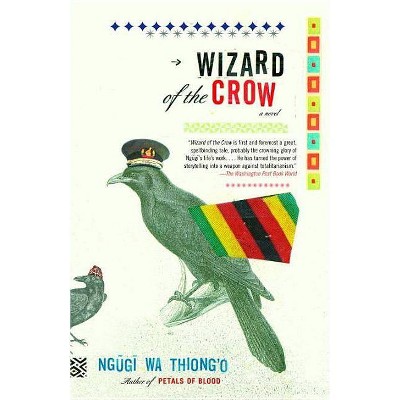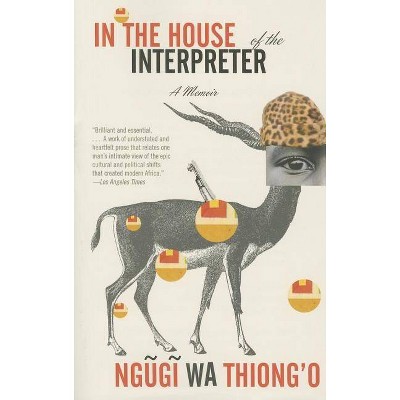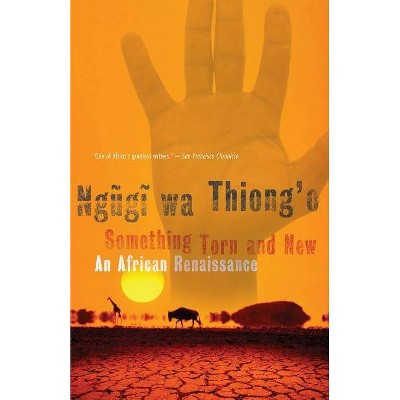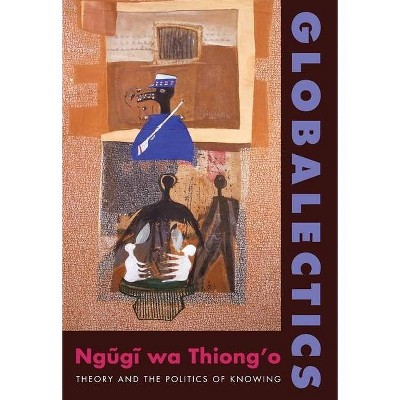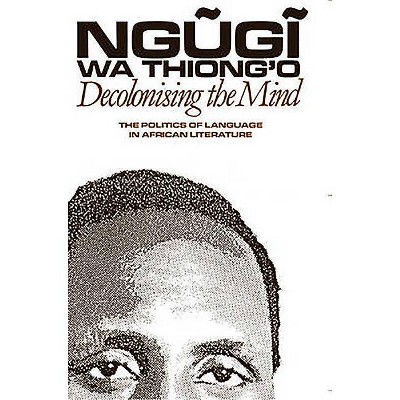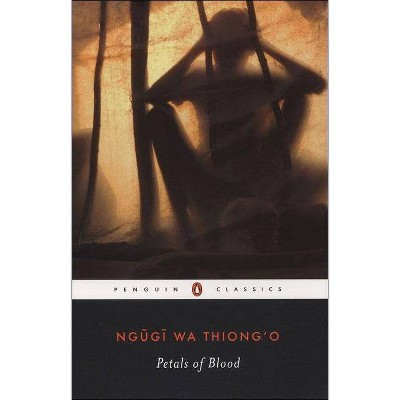Wrestling with the Devil - by Ngugi Wa Thiong'o (Hardcover)
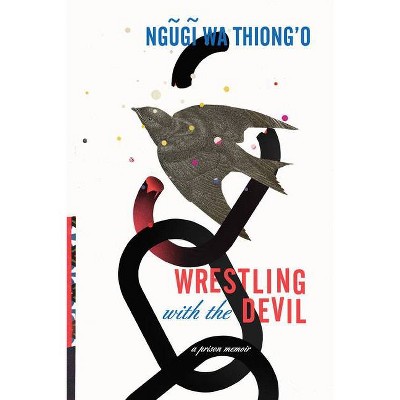
Similar Products
Products of same category from the store
AllProduct info
<p/><br></br><p><b> About the Book </b></p></br></br>"[This book] ... begins literally half an hour before [the author's release from prison] on December 12, 1978. In one extended flashback he recalls the night, a year earlier, when armed police pulled him from his home and jailed him in Kenya's ... [maximum security prisons]. There, he lives in a prison block with eighteen other political prisoners, quarantined from the general prison population. In a conscious effort to fight back the humiliation and the intended degradation of the spirit, [the author] ... decides to write a novel on toilet paper, the only paper to which he has access, a book that will become his classic, Devil on the cross. Written in the early 1980s and never before published in America, [this book is an account of the author's] drama and the challenges of writing the novel under twenty-four-hour surveillance. He captures not only the excruciating pain that comes from being cut off from his wife and children, but also the spirit of defiance that defines hope. Ultimately, [this book] is a testimony to the power of imagination to help humans break free of confinement, which is truly the story of all art"--<p/><br></br><p><b> Book Synopsis </b></p></br></br><b>A <i>New York Times</i> Editors' Choice <p/>A welcome addition to the vast literature produced by jailed writers across the centuries . . . [a] thrilling testament to the human spirit.<br>--Ariel Dorfman, <i>The New York Times Book Review</i> <p/><i>Wrestling with the Devil</i> is a powerful testament to the courage of Ngũgĩ and his fellow prisoners and validation of the hope that an independent Kenya would eventually emerge.</b><br>--<b><i>Minneapolis Star Tribune</i></b> <p/><b>The Ngũgĩ of <i>Wrestling with the Devil</i> called not just for adding a bit of color to the canon's sagging shelf, but for abolition and upheaval.<br>--<b><i>Bookforum</i></b> <p/>An unforgettable chronicle of the year the brilliant novelist and memoirist, long favored for the Nobel Prize, was thrown in a Kenyan jail without charge</b> <p><em>Wrestling with the Devil</em>, Ngũgĩ wa Thiong'o's powerful prison memoir, begins literally half an hour before his release on December 12, 1978. In one extended flashback he recalls the night, a year earlier, when armed police pulled him from his home and jailed him in Kenya's Kamĩtĩ Maximum Security Prison, one of the largest in Africa. There, he lives in a prison block with eighteen other political prisoners, quarantined from the general prison population.</p> <p>In a conscious effort to fight back the humiliation and the intended degradation of the spirit, Ngũgĩ--the world-renowned author of <em>Weep Not, Child</em>; <em>Petals of Blood</em>; and <em>Wizard of the Crow</em>--decides to write a novel on toilet paper, the only paper to which he has access, a book that will become his classic, <em>Devil on the Cross</em>.</p> <p>Written in the early 1980s and never before published in America, <em>Wrestling with the Devil</em> is Ngũgĩ's account of the drama and the challenges of writing the novel under twenty-four-hour surveillance. He captures not only the excruciating pain that comes from being cut off from his wife and children, but also the spirit of defiance that defines hope. Ultimately, <em>Wrestling with the Devil</em> is a testimony to the power of imagination to help humans break free of confinement, which is truly the story of all art.</p><p/><br></br><p><b> Review Quotes </b></p></br></br><br><b>Praise for <i>Wrestling with the Devil</i>: </b><br><b>A <i>New York Times</i> Editors' Choice</b> <p/>"This thrilling testament to the human spirit had, for me, a fierce resonance. . . . I could not help feeling that his luminous words were meant for those victims and many others being persecuted across the world, a way of urging humanity to never surrender to the demons of fear and silence."<br>--<b>Ariel Dorfman, <i>The New York Times Book Review</i></b> <p/><i>Wrestling with the Devil</i> is a powerful testament to the courage of Ngũgĩ and his fellow prisoners and validation of the hope that an independent Kenya would eventually emerge.<br>--<b><i>Minneapolis Star Tribune</i></b> <p/>★ [A] masterly work. . . . Through this incredibly vivid account, one can learn much about Kenyan colonial and postcolonial history. For all readers who want to understand better issues of injustice.<br>--<b><i>Library Journal</i> (starred review)</b> <p/>With elegant prose and compelling arguments, this is highly recommended.<br>--<b><i>Booklist </i></b> <p/>Engrossing ... At once exhilarating and defiant, [Ngũgĩ] wa Thiong'o's memoir is a thought provoking document of a grim time in Kenyan history.<br>--<b><i>Publishers Weekly </i></b> <p/>The Ngũgĩ of <i>Wrestling with the Devil</i> called not just for adding a bit of color to the canon's sagging shelf, but for abolition and upheaval.<br>--<b><i>Bookforum</i></b> <p/>Long after the Kenyatta tyranny, the author refocuses the narrative so that it is less about the specifics of abuses suffered under that regime and more about sustaining the spirit of resistance while subjected to years of incarceration. . . . Four decades after the imprisonment detailed here, the issues remain fresh.<br>--<b><i>Kirkus Reviews</i></b> <p/><b>Praise for Ngũgĩ wa Thiong'o's <i>Birth of a Dream Weaver</i>: </b><br><b>One of <i>Oprah.com</i>'s 17 Must-Read Books for the New Year and <i>O</i> Magazine's 10 Titles to Pick up Now.</b> <p/>Exquisite in its honesty and truth and resilience, and a necessary chronicle from one of the greatest writers of our time. <br>--<b>Chimamanda Ngozi Adichie, <i>The Guardian</i>, Best Books of 2016.</b> <p/>It's hard to think of another living writer today--Orhan Pamuk, perhaps--who speaks so inspiringly and convincingly about the value of literature. No serious reader will want to miss this riveting story.<br>--<b><i>The Washington Post</i></b> <p/>An eloquent, perceptive memoir. . . Evocative, poignant, and thoughtful, Thiong'o's courageous narrative will linger in readers' minds.<br>--<b><i>Publishers Weekly</i> (starred)</b> <p/>A writer's coming-of-age tale featuring an artistic mix of pride and humility.<br>--<b><i>Kirkus Reviews</i> </b> <p/>An autobiographical masterpiece. . . As essential as Achebe's There Was a Country, this is a riveting read in African history and literature.<br>--<b><i>Library Journal</i> (starred)</b> <p/>This is a powerful recollection of a turbulent time that produced leaders from Tom Mboya and Jomo Kenyatta to the tyrannical Idi Amin in response to the brutality of a dying colonialism.<br>--<b><i>Booklist</i></b> <p/> <b>Praise for Ngũgĩ wa Thiong'o's work: </b> <br>Evocative, poignant, and thoughtful, Thiong'o's courageous narrative will linger in readers' minds.<br>--<b><i>Publishers Weekly</i> (starred)</b> <p/>In his crowded career and his eventful life, Ngũgĩ has enacted, for all to see, the paradigmatic trials and quandaries of a contemporary African writer, caught in sometimes implacable political, social, racial, and linguistic currents.<br>--<b>John Updike, <i>The New Yorker</i></b> <p/>Ngũgĩ has dedicated his life to describing, satirising and destabilising the corridors of power. . . . Still living in exile and writing primarily in Gikuyu, Ngũgĩ continues to spin captivating tales.<br>--<b><i>The Guardian</i></b> <p/>Ngũgĩ has flown over the entire African continent and sniffed out all of the foul stenches rising high into the air: complacency toward despotism, repression of women and ethnic minorities, widespread corruption and--undergirding all of these--a neocolonial system in which today's lending banks and multinationals have supplanted yesterday's European overlords.<br>--<b><i>The New York Times Book Review</i></b> <br><br><p/><br></br><p><b> About the Author </b></p></br></br>One of the leading African writers and scholars at work today, <b>Ngũgĩ wa Thiong'o</b> was born in Limuru, Kenya, in 1938. He is the author of <em>A Grain of Wheat</em>; <em>Weep Not, Child</em>; <em>Petals of Blood</em>; and <em>Birth of a Dream Weaver</em>. He is currently distinguished professor in the School of Humanities and the director of the International Center for Writing and Translation at the University of California, Irvine. He has been nominated for the Man Booker International Prize.
Price History
Cheapest price in the interval: 20.49 on October 28, 2021
Most expensive price in the interval: 20.49 on December 17, 2021
Price Archive shows prices from various stores, lets you see history and find the cheapest. There is no actual sale on the website. For all support, inquiry and suggestion messagescommunication@pricearchive.us
